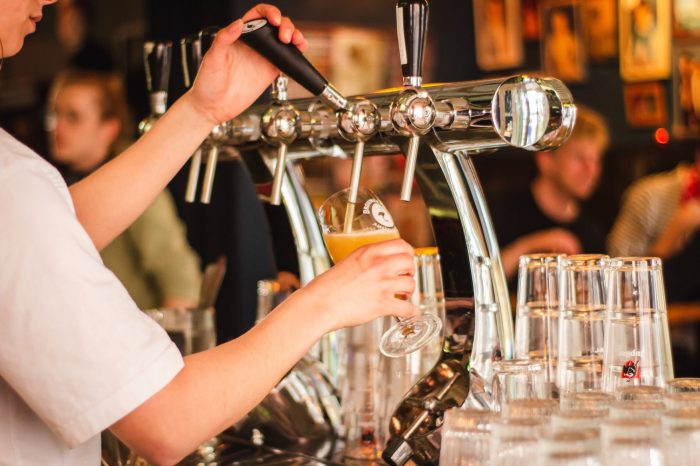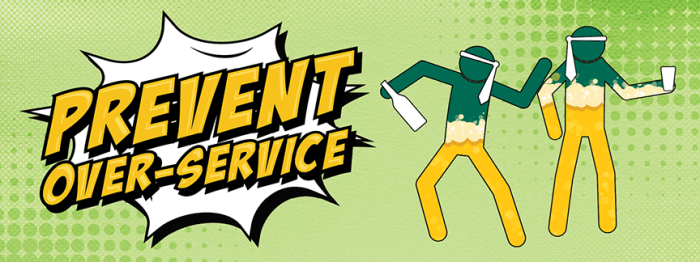Wisconsin responsible beverage server training answers – The Wisconsin Responsible Beverage Server Training program is a comprehensive resource designed to equip servers with the knowledge and skills necessary to serve alcohol responsibly and prevent underage drinking. This training is crucial for ensuring compliance with Wisconsin’s alcohol laws and protecting both servers and establishments from legal liability.
The program covers a wide range of topics, including the legal requirements for serving alcohol, the signs and consequences of underage drinking, and techniques for recognizing and responding to intoxication. By understanding and applying the principles Artikeld in this training, servers can play a vital role in promoting responsible drinking habits and maintaining a safe and enjoyable environment for patrons.
1. Wisconsin Responsible Beverage Server Training
Understanding the Basics

The Wisconsin Responsible Beverage Server Training program aims to equip servers with the knowledge and skills necessary to serve alcohol responsibly and comply with state laws. It covers legal requirements, intoxication recognition, and strategies for preventing underage drinking and promoting responsible consumption.
Serving alcohol in Wisconsin requires compliance with specific legal mandates. Non-compliance can result in severe consequences, including fines, license suspensions, and criminal charges.
The training program encompasses various topics, including:
- Legal responsibilities of servers
- Identification and prevention of underage drinking
- Recognition and response to intoxication
- Handling difficult customers and refusing service
- Promotion of responsible drinking habits
2. Identifying and Preventing Underage Drinking
Underage drinking poses significant risks to youth and public safety. Servers play a crucial role in preventing underage access to alcohol by recognizing signs and behaviors indicative of underage drinking.
Common signs include:
- Attempting to purchase or consume alcohol without a valid ID
- Appearing visibly intoxicated
- Being accompanied by older individuals who are purchasing alcohol for them
Serving alcohol to minors is a serious offense with legal consequences. Servers must refuse service to individuals who appear underage or lack proper identification.
Strategies for preventing underage drinking include:
- Carding all customers who appear under the age of 21
- Refusing service to intoxicated individuals
- Reporting suspected underage drinking to management or law enforcement
3. Recognizing and Responding to Intoxication: Wisconsin Responsible Beverage Server Training Answers

Alcohol intoxication can impair judgment, coordination, and behavior. Servers must be able to recognize the signs of intoxication and respond appropriately.
Physical and behavioral signs of intoxication include:
- Slurred speech
- Loss of coordination
- Impaired judgment
- Aggressive or belligerent behavior
Servers have a legal responsibility to refuse service to intoxicated patrons. Assessing intoxication levels involves observing behavior, conducting field sobriety tests, and considering the individual’s blood alcohol concentration (BAC).
Guidelines for assessing intoxication include:
- Observe the individual’s behavior and appearance
- Conduct a field sobriety test, such as the walk-and-turn test or one-leg stand test
- Estimate the individual’s BAC using a breathalyzer or other method
4. Handling Difficult Customers and Refusing Service
Dealing with difficult customers is a common challenge in the hospitality industry. Servers must maintain a professional demeanor while de-escalating conflicts and enforcing policies.
Techniques for de-escalating conflicts include:
- Remaining calm and respectful
- Actively listening to the customer’s concerns
- Offering alternative solutions or compromises
Servers have the legal right to refuse service to intoxicated or disruptive individuals. Grounds for refusing service include:
- Appearing visibly intoxicated
- Engaging in disorderly or disruptive behavior
- Threatening or harassing other patrons or staff
Refusals should be handled professionally and respectfully. Servers should explain the reason for refusal and offer alternative options, such as calling a taxi or providing information on local support services.
5. Promoting Responsible Drinking

Servers play a vital role in promoting responsible drinking habits. By encouraging patrons to drink responsibly, they can help prevent alcohol-related problems and create a safer environment.
Strategies for promoting responsible drinking include:
- Offering non-alcoholic options and limiting drink sizes
- Educating customers about the risks of excessive alcohol consumption
- Monitoring patrons for signs of intoxication and intervening if necessary
By promoting responsible drinking, servers can create a positive and safe environment for both patrons and staff.
6. Legal Responsibilities and Liability
Servers have significant legal responsibilities when serving alcohol. Non-compliance with laws and regulations can result in serious consequences.
Servers are liable for:
- Serving alcohol to minors
- Serving alcohol to intoxicated individuals
- Failing to prevent underage drinking
- Failing to maintain accurate records and documentation
Maintaining accurate records is crucial for demonstrating compliance and protecting against legal liability. Servers should keep records of:
- Alcohol sales
- Refusals of service
- Incidents of intoxication or underage drinking
In the event of an incident, servers should cooperate fully with law enforcement and report the incident to their supervisor or manager.
7. Additional Resources and Support

Servers have access to a variety of resources and support to assist them in fulfilling their responsibilities and handling difficult situations.
Resources include:
- Training materials and online resources
- Hotlines and support organizations
- Professional organizations and industry associations
Seeking assistance when dealing with difficult situations or legal issues is essential for protecting both the server and the establishment. Servers should stay up-to-date on changes in alcohol laws and regulations to ensure compliance and maintain a safe and responsible environment.
FAQ Explained
What are the legal consequences of serving alcohol to minors in Wisconsin?
Serving alcohol to minors is a serious offense in Wisconsin and can result in fines, license suspensions, or even criminal charges.
What are the signs of alcohol intoxication that servers should look for?
Signs of alcohol intoxication include slurred speech, impaired coordination, and difficulty focusing.
What should servers do if they suspect a customer is intoxicated?
If a server suspects a customer is intoxicated, they should refuse to serve them alcohol and offer non-alcoholic options instead.